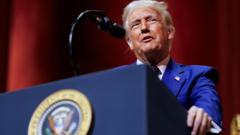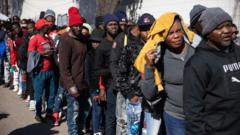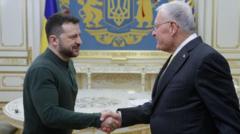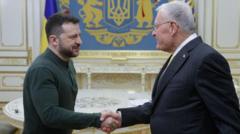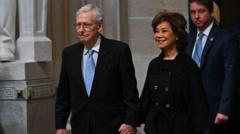As the G7 nations mark three years since Russia's invasion of Ukraine, the U.S. has raised objections to the inclusion of language that characterizes Russia as the aggressor, instead promoting a more neutral stance.
US Stance on Russia-Ukraine Conflict Sparks Controversy in G7 Discussions

US Stance on Russia-Ukraine Conflict Sparks Controversy in G7 Discussions
In a contentious move, the U.S. opposes labeling Russia as the aggressor in G7's forthcoming statement on Ukraine, reflecting President Trump's recent controversial remarks.
In the wake of President Trump's controversial remarks blaming Ukraine for the war, the U.S. has recommended alterations to a draft statement prepared by Canada for the G7, leading to significant diplomatic tension among member countries regarding the portrayal of the conflict.
The United States has recently opposed using the term "aggressor" in a draft statement from the Group of 7 (G7) that commemorates the third anniversary of Russia's full-scale invasion of Ukraine. This resistance follows President Trump attributing the blame for the war on Ukraine rather than Russia. As a result, key G7 officials noted that the latest draft lacks the historically utilized terms such as "Russian aggression," which have featured in previous G7 communications since the war's escalation in February 2022.
Canada, currently occupying the G7 presidency, initiated the first draft, which included language supportive of Ukraine. However, U.S. officials have revised this document to remove references to Ukraine as a victim and to refrain from categorizing Russia's actions as aggressive. A senior G7 official indicated that the revised draft describes the war as a "devastating conflict" that commenced with Russia's invasion but prohibits any labeling of Russia in a negative light.
Diplomatic conversations are ongoing among the G7 members to reach a consensus on an appropriate version of the statement that adequately reflects their positions on the conflict. The ongoing disagreements highlight broader geopolitical tensions within the G7 as they navigate varying attitudes toward Russia and Ukraine amid complicated international relations.
The United States has recently opposed using the term "aggressor" in a draft statement from the Group of 7 (G7) that commemorates the third anniversary of Russia's full-scale invasion of Ukraine. This resistance follows President Trump attributing the blame for the war on Ukraine rather than Russia. As a result, key G7 officials noted that the latest draft lacks the historically utilized terms such as "Russian aggression," which have featured in previous G7 communications since the war's escalation in February 2022.
Canada, currently occupying the G7 presidency, initiated the first draft, which included language supportive of Ukraine. However, U.S. officials have revised this document to remove references to Ukraine as a victim and to refrain from categorizing Russia's actions as aggressive. A senior G7 official indicated that the revised draft describes the war as a "devastating conflict" that commenced with Russia's invasion but prohibits any labeling of Russia in a negative light.
Diplomatic conversations are ongoing among the G7 members to reach a consensus on an appropriate version of the statement that adequately reflects their positions on the conflict. The ongoing disagreements highlight broader geopolitical tensions within the G7 as they navigate varying attitudes toward Russia and Ukraine amid complicated international relations.






